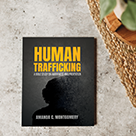You may have heard the popular phrase that “prostitution is the oldest profession,” but many trafficking survivors challenge this notion by suggesting that human trafficking may actually be one of the oldest crimes in history. The exploitation of one person by another for personal gain has been evident in communities all over the world for thousands of years, and the Bible records many accounts where human trafficking, sexual exploitation, or other forms of power abuse have occurred. What if these scriptural accounts could be used to inform Christians about how to approach anti-trafficking work in ways that honor God, show dignity to survivors, and hold perpetrators accountable?
As a trauma-informed marriage and family therapist and an ordained pastor, I sought to combine the experience I have received from both professions, along with research from the anti-trafficking field, to write Human Trafficking: A Bible Study on Awareness and Prevention. The six-week study is designed to be used by churches, small groups, and individuals. Boiled down to its simplest structure, three main groups are impacted by human trafficking—survivors, perpetrators (in the form of both traffickers and consumers), and the community in which the crime takes place. Each of these three groups has a particular role to play in anti-trafficking work. This book has been designed to be used by any or all of the three groups.
The goal of the study is twofold. First, it is meant to be educational. Participants are introduced to biblical accounts of trafficking or exploitation and will learn how to understand these narratives through the whole lens of Scripture. Participants will learn important information that is integral to most trafficking awareness courses—including definitions, red flags, and common myths that perpetuate the problem.
The book’s second goal is to lead participants toward a personal journey of growth and transformation. The topic of human trafficking is disturbing and can bring up feelings of discomfort. As a therapist, I attempt to guide participants through the pain instead of around it. Often, in the midst of a painful awareness, participants may begin to feel a connection with those who have suffered unimaginable pain. Utilizing biblical accounts as the context for group conversations on trafficking allows participants to wrestle with Scripture rather than modern-day survivors’ personal stories. Scripture provides the foundation necessary to establish a Christian approach to anti-trafficking work that honors survivors, offers God’s conviction and redemption to perpetrators, and calls God’s people to be involved in breaking the yoke of human exploitation in their local communities.
Whether you are well versed in Scripture but new to trafficking awareness or the other way around, my hope is that this book gives you a new and motivating perspective on trafficking awareness and prevention.
 Human Trafficking is available to order on TheFoundryPublishing.com
Human Trafficking is available to order on TheFoundryPublishing.com





0 Comments